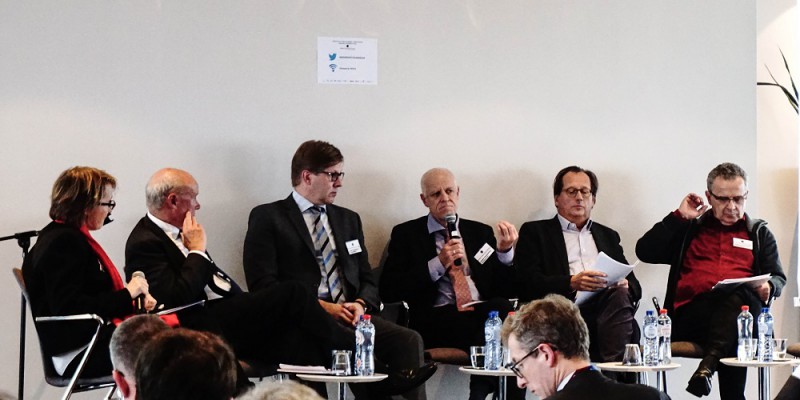EU spectrum policy needs to ensure access to and diversity of content

One year after the Lamy report’s publication and shortly before the World Radiocommunications Conference 2015, senior representatives from broadcasting, network infrastructure, trade unions, viewer groups and media organisations met in Brussels to engage with EU Commissioner in charge of the Digital Single Market Mr Günther Oettinger and Member of the Parliament Mr Pascal Lamy on spectrum policy and the future of Europe’s audiovisual, creative and cultural sector.
Frequencies are at the heart of a future proof audiovisual, radio and live performance sector; with spectrum as a core driver for cultural diversity, creative jobs and growth in the Digital Single Market. This was the Wider Spectrum Group’s message today in Brussels, ahead of major international policy decisions next month and the elaboration of a long-term EU strategy for the Ultra High Frequency (UHF) band next year.
Today’s discussions, featuring Commissioner Oettinger, MEP Lamy, and senior representatives of Europe’s cultural and audiovisual industries clearly showed that spectrum allocation has a wider impact across the European audiovisual sector and that it is at the heart of a media, creative and cultural economic sector that is a leader in terms of GDP and jobs[1].
Addresssing the audience at the openning of the debate, Commissioner Oettinger said, “The creation and distribution of audiovisual content is one of the main drivers of the digital economy.” He also highlighted the importance of providing incentive to allow the continous creation of content.
Representatives of the Wider Spectrum Group called on EU policy-makers to:
- Acknowledge the business, investment and funding models to ensure sustainable levels of efforts and investments by enterprises and workers in production, infrastructure and innovation;
- Uphold the importance of local / national works as supporting employment, cultural diversity and media plurality;
- Enshrine guaranteed access to critical resources such as spectrum for services that sustain Europe’s creative and cultural industry.
Mogens Blicher Bjerregård, the EFJ President said, “There is a need for a balanced approach in the EU spectrum policy in order to ensure a pluralistic media market and quality and diversity in content.”
“Journalism is a public good as it is a prerequisite for the development of our democracies. A pluralistic media landscape means that citizens can have universal access to content of high quality and trustworthy information. The debate about spectrum policy is not just a question of access, speed, but also about content and the workers who provided the added values to the content consumed by the public. EU policy makers must not forget about this.”
The Conference entitled Free-to-Air | Free to Create | Free to Grow allowed voices from diverse sectors and communities to call for a EU spectrum policy that takes a comprehensive approach to the realities of content production and distribution and the wider downstream impact of spectrum allocation.
The Wider Spectrum Group acknowledged the wisdom of the Lamy report’s recommendations for a balanced approach to spectrum allocation. As such, the Group emphasised the crucial role of Digital Terrestrial Television (covering 250M EU citizens), free-to-air radio (80% of EU citizens listen to at least 2 to 3 hours per day), PMSE[2] and live performance in Europe’s ability to continue to create and distribute world class content.
Europe’s unique AV, radio and live performance model is built on cultural diversity and media pluralism and is Europe’s greatest competitive asset in the global digital race. Spectrum allocation is one of the key foundations supporting a virtuous cycle of public access, broadcasting and infrastructure innovation, local investments in works and jobs, and diversity of content.
(Photo Credit : Milton Pereira)
About the Wider Spectrum Group The Wider Spectrum Group (WSG) brings together several organisations representing civil society as well as employee and employer representatives. Together these organisations represent the interests of listeners and viewers, workers and businesses in the field of audiovisual, radio, live performance, programme-making and special events. WSG members share a common view on the need to ensure European and national policies regarding frequency allocation preserve the potential for European growth, innovation and sustainable employment. Read our Shared Vision here | See mentions of the WSG in the press here | See our most recent communications here
[1] The creative and cultural industry sector taken at large is accounting for 6.8% share of EU GDP (€860 billion) and 6.5% of Europe’s employment (approximately 14 million direct and indirect jobs)
[2] Programme Making and Special Events, including wireless microphones and cameras











